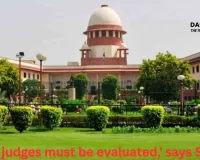Personal laws permit child marriage but POCSO and BNS criminalize it; Delhi HC stresses need for Uniform Civil Code
Digital Desk
.jpg)
On Friday, The Delhi High Court strongly advocated for the implementation of a Uniform Civil Code (UCC) across India, highlighting frequent and troubling conflicts between personal laws and national statutes such as the Protection of Children from Sexual Offences (POCSO) Act and the Bharatiya Nyaya Sanhita (BNS).
Justice Arun Monga made the remarks while hearing the bail petition of Hamid Raza, accused of marrying a minor girl.
The judge observed that under existing personal laws, child marriage is permissible, whereas the same act is a punishable offence under national law.
This contradiction, he said, creates legal dilemmas and raises larger questions about whether society should continue to be criminalised for following long-standing customs rooted in personal laws.
The High Court noted several serious inconsistencies and questionable circumstances surrounding the case.
Firstly, the minor girl was living with Raza prior to his arrest, and her stepfather, who signed the FIR, is himself facing trial for sexually assaulting the girl and fathering her first child. This, the court remarked, raised suspicions about the credibility of the FIR and its intent.
Secondly, the girl’s age records were riddled with contradictions. Her documents placed her birth year between 2010 and 2011, hospital records showed she was 17 at the time of her first delivery, while in her own affidavit she claimed to be 23. The court held that the dispute over age could only be conclusively resolved during trial.
The court posed the question of whether the time had come to move decisively towards a Uniform Civil Code that could harmonise such contradictions by ensuring personal laws do not override national laws
Raza was booked under Section 376 of the Indian Penal Code and the POCSO Act after the girl’s stepfather filed an FIR accusing him of marrying a minor.
Justice Monga further observed that Raza’s arrest violated constitutional provisions, particularly his right to a speedy trial.
The long delay in registering the case, coupled with inconsistencies in evidence, worked in Raza’s favour. On these grounds, the court granted him bail.
The case also brought into focus the differing positions of personal and statutory law. Under Islamic personal law, a girl is deemed marriageable upon attaining puberty, generally defined as 15 years of age.
However, under the POCSO Act and the BNS, marriage or sexual relations with any person under 18 years of age is a criminal offence, regardless of personal or religious customs.
This contradiction, the court underlined, is a recurring source of conflict that requires legislative resolution.
Marriage under Muslim Personal Law vs National statutes
The High Court’s comments and Uttarakhand’s move are expected to reignite nationwide debate on the UCC, a subject that has remained contentious for decades, pitting reformists calling for equality under one law against defenders of religious autonomy and customs.
Court’s observations coincided with a landmark development in Uttarakhand, which became the first state in independent India to formally implement the Uniform Civil Code. Chief Minister Pushkar Singh Dhami announced the enforcement on January 27, 2025.
The new law, practices such as halala, polygamy, and instant triple talaq have been banned in Uttarakhand.
This makes the state the first after Goa to adopt UCC provisions. However, while Goa has followed a civil code since the colonial era under the Portuguese Civil Code, Uttarakhand is the first to enact and implement such legislation post-independence.


12.png)

9.png)





.jpg)
